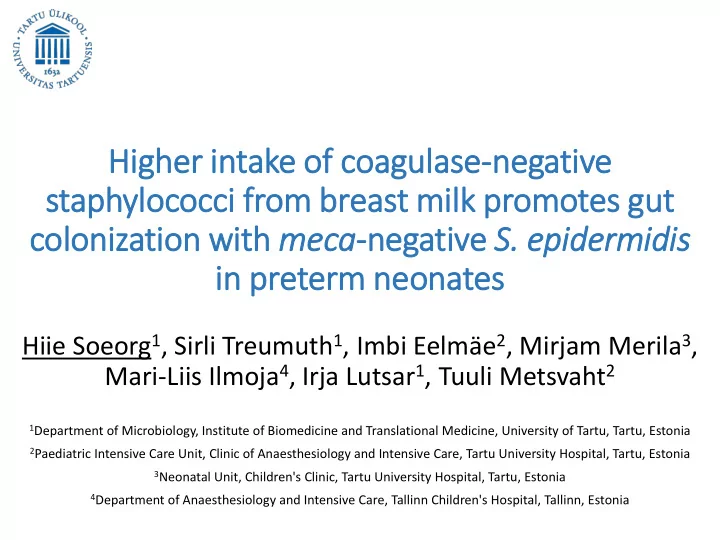

Higher in intake of f coagulase-negative staphylococci fr from breast mil ilk promotes gut t colonization wit ith meca -negative S. . epidermidis in in preterm neonates Hiie Soeorg 1 , Sirli Treumuth 1 , Imbi Eelmäe 2 , Mirjam Merila 3 , Mari-Liis Ilmoja 4 , Irja Lutsar 1 , Tuuli Metsvaht 2 1 Department of Microbiology, Institute of Biomedicine and Translational Medicine, University of Tartu, Tartu, Estonia 2 Paediatric Intensive Care Unit, Clinic of Anaesthesiology and Intensive Care, Tartu University Hospital, Tartu, Estonia 3 Neonatal Unit, Children's Clinic, Tartu University Hospital, Tartu, Estonia 4 Department of Anaesthesiology and Intensive Care, Tallinn Children's Hospital, Tallinn, Estonia
Faculty Disclosure x No, nothing to disclose Yes, please specify: Ownership/ Honoraria/ Consulting/ Funded Royalties/ Stock Other Company Name Equity Employee Expenses Advisory Board Research Patent Options (please specify) Position
Background • S. epidermidis causing late-onset sepsis in preterm neonates • 87-100% are mecA -positive (Salgueiro et al. 2017, Soeorg et al. 2017) • colonize gut prior to the onset of infection (Soeorg et al. 2013) Mother’s own milk (MOM) of mothers of preterm neonates • rich in S. epidermidis that are mostly mecA -negative (MSSE) (Soeorg et al. 2017) • feeding with MOM → the proportion of MSSE increases in gut of preterm neonates (Soeorg et al. 2017)
Aim im • To determine factors associated with gut colonization of preterm neonates with mecA -negative Staphylococcus epidermidis strains present in mother’s own milk.
Meth thods MOM – mother’s own milk
Neonates Preterm neonates Term neonates (n=49) (n=20) Gestational age (median) 28 weeks 40 weeks Birth weight (median) 1.15 kg 3.65 kg Exclusively MOM-fed 6% 100% Age at initiation of MOM-feeding 2 days 0 days (median) Cumulative % of MOM of total enteral feeds (median) 0-3 days 28% 100% 0-7 days 77% 100% 0-14 days 95% 100% 0-21 days 97% 100% MOM – mother’s own milk
MSSE in in neonates & & mothers MOM – mother’s own milk MSSE – mecA -negative S. epidermidis
Colo loniz izatio ion of f gut of f neonates wit ith MSSE present in in MOM Median (IQR) age at colonization with MSSE present in MOM: 2 (1-6) days vs 15.5 (11-21) (p<0.001) MOM – mother’s own milk MSSE – mecA -negative S. epidermidis
Factors associa iated wit ith gut colo loniz ization wit ith MSSE present in in MOM in in preterm neonates Cox proportional hazards regression with Firth’s penalized likelihood Hazard ratio (95% CI) p-value Daily intake of CoNS from MOM (10 6 cfu) 1.006 (1.00-1.01) 0.049 Proportion of mecA -positive S. epidermidis or S. 0.09 (0.01-0.49) 0.004 haemolyticus strains spreading in NICU and causing LOS among all staphylococci in gut Not associated with gut colonization with MSSE present in MOM ▪ gestational age, birth weight, delivery mode cfu – colony forming unit ▪ treatment with antibiotics CI – confidence interval CoNS – coagulase-negatiive staphylococci ▪ amount of enteral feeds (mL) LOS – late-onset sepsis MOM – mother’s own milk ▪ count of CoNS in MOM (cfu/mL) MSSE – mecA -negative S. epidermidis
Proportio ion of f MRSE among S. S. epid idermidis in in gut of f preterm neonates colo loniz ized wit ith MSSE present in in MOM CI – confidence interval MOM – mother’s own milk MRSE – mecA -positive S. epidermidis MSSE – mecA -negative S. epidermidis
Colo loniz izatio ion wit ith MSSE present in in MOM & la late- onset sepsis is caused by by CoNS Median (IQR) at the onset of LOS caused by CoNS 8 (5-14) days. CoNS – coagulase-negatiive staphylococci LOS – late-onset sepsis MOM – mother’s own milk MSSE – mecA -negative S. epidermidis
Gut colo loniz ization dynamics in in preterm neonates MOM – mother’s own milk MSSE – mecA -negative S. epidermidis
Conclusion ▪ Larger proportion of ▪ Prevention of colonization of gut with mecA- positive staphylococcal unpasteurized MOM in enteral strains spreading in NICU feeds ▪ Promote gut colonization with MSSE present in MOM ▪ Reduce the abundance of MRSE in gut ▪ May reduce the risk of late-onset sepsis MOM – mother’s own milk MRSE – mecA -positive S. epidermidis MSSE – mecA -negative S. epidermidis
Acknowledgements This study was funded by Estonian Research Council (IUT34-24), European Regional Development Fund (Project SFOS WP1-NeuroAIDS), Archimedes Foundation (Project No. 3.2.1001.11-0032) and the European Society for Paediatric Infectious Diseases (ESPID Small Grant Award) and supported by Estonian Ministry of Education and Research (Grant No. KOGU-HUMB).
Recommend
More recommend